
Competitive market insertion strategy through the principles of Fair Trade. Case actors of the popular and solidarity economy of Ecuador, provinces of Azuay and Cañar. Year 2019
-
Competitive market insertion strategy through the principles of Fair Trade. Case actors of the popular and solidarity economy of Ecuador, provinces of Azuay and Cañar. Year 2019
-
DOI: 10.22533/at.ed.3172162225075
-
Palavras-chave: -
-
Keywords: fair trade, popular and solidarity economy, competitive strategy, competitive development.
-
Abstract:
Fair trade has undergone significant growth over the past few years, its principles allow organizations to be inserted into a trade market that contributes to the economic, social, environmental, political and cultural sustainability of a region, although it still continues growing compared to traditional trade which is a participant in the greater market share. This article determines the strategies of competitive insertion into the international market through the principles of fair trade in the actors of the popular and solidarity economy of the cities of Azogues and Cuenca in Ecuador and their participation in world trade. The principles are based on the results of the research, which conform to the political and socio-economic environment of the cities under study.
It can be evidenced that despite knowing the term fair trade, the application of its principles is not representative due to the lack of economic resources, infrastructure, organizational structure, innovation in products and services, quality and optimal processes for the sustainable development of the associations. However, the support received by the Superintendence of Popular and Solidarity Economy as a governmental entity, through the Institute of Popular Solidarity Economy facilitates the growth of this sector by strengthening and revitalizing the production, distribution, and financing processes.
Based on the results obtained, the principles proposed by the World Fair Trade Organization are applied, with sustainable strategies and optimal working conditions that are consistent with the needs of the sector to which the associations under study belong.
-
Número de páginas: 28
- Dayanara-Isabel Villafuerte-Escudero
- KARLA GABRIELA TAPIA CARREÑO


